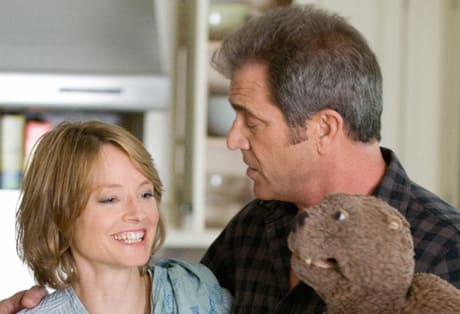Sharing an abundance of thematic similarities to her first two feature films (Little Man Tate and Home for the Holidays), The Beaver marks a directorial hat trick of sorts for Jodie Foster, using family as a bigger paradigm of people trapped in cycles of normalcy performance, unable to communicate and connect with those closest to them. Only this time, the comedy/drama interface is heightened and exaggerated by the narrative crux of a beaver hand puppet, representing and mocking the social custom of walking through life with a brave face and contrived personality.
Said beaver comes into the life of Walter Black (Mel Gibson) at a low point, when depression has left him self-medicating with vodka and attempting suicide in a motel washroom. It becomes a safety net for Walter, giving him distance from his personality so that he can portray the optimistic and enthused patriarch for his work-obsessed wife, Meredith (Foster), and crisis-ridden son, Porter (Anton Yelchin).
Of course, the overt nature of the scenario, wherein a grown man walks through life talking with a fake accent through a beaver hand puppet, eventually grates on his family and Walter himself, seeing as everyone wants this image to be the real him regardless of the very real, masked suffering underneath it all.
Oddly enough, the one thing that never works in this ode to depression and social insanity is the central premise of the beaver. Sure, it lends itself to the overriding theme symbolically and is necessary for the film to exist, but the melancholic tone of the story never meshes with the audacity of the situation, especially when Foster directs all internal conflict between Walter and the puppet with stationary observations that anthropomorphize the beaver through reaction only.
More interesting is the fact that this doesn't hinder the overall impact, rather it merely detracts from the many other fully realized and emotionally complex moments with the more identifiable and engaging Porter. His fear of becoming his father manifests itself in active modes of self-hatred. He similarly disengages from his personality by writing papers and speeches for his peers, diving deep into their psychology to find an adjacent form of identity. This becomes problematic when he attempts to write a graduation speech for the seemingly perfect and peppy Norah (Jennifer Lawrence), whose masked sadness and false presentation stir repressed emotions and feelings of connection.
It's this secondary storyline of reluctant passion in an insane world where everyone is walking around pretending that everything is okay that gives heart and centre to what is ostensibly a tonally inconsistent, but powerful social critique that's equal parts emotion and intellect.
(eOne)Said beaver comes into the life of Walter Black (Mel Gibson) at a low point, when depression has left him self-medicating with vodka and attempting suicide in a motel washroom. It becomes a safety net for Walter, giving him distance from his personality so that he can portray the optimistic and enthused patriarch for his work-obsessed wife, Meredith (Foster), and crisis-ridden son, Porter (Anton Yelchin).
Of course, the overt nature of the scenario, wherein a grown man walks through life talking with a fake accent through a beaver hand puppet, eventually grates on his family and Walter himself, seeing as everyone wants this image to be the real him regardless of the very real, masked suffering underneath it all.
Oddly enough, the one thing that never works in this ode to depression and social insanity is the central premise of the beaver. Sure, it lends itself to the overriding theme symbolically and is necessary for the film to exist, but the melancholic tone of the story never meshes with the audacity of the situation, especially when Foster directs all internal conflict between Walter and the puppet with stationary observations that anthropomorphize the beaver through reaction only.
More interesting is the fact that this doesn't hinder the overall impact, rather it merely detracts from the many other fully realized and emotionally complex moments with the more identifiable and engaging Porter. His fear of becoming his father manifests itself in active modes of self-hatred. He similarly disengages from his personality by writing papers and speeches for his peers, diving deep into their psychology to find an adjacent form of identity. This becomes problematic when he attempts to write a graduation speech for the seemingly perfect and peppy Norah (Jennifer Lawrence), whose masked sadness and false presentation stir repressed emotions and feelings of connection.
It's this secondary storyline of reluctant passion in an insane world where everyone is walking around pretending that everything is okay that gives heart and centre to what is ostensibly a tonally inconsistent, but powerful social critique that's equal parts emotion and intellect.




